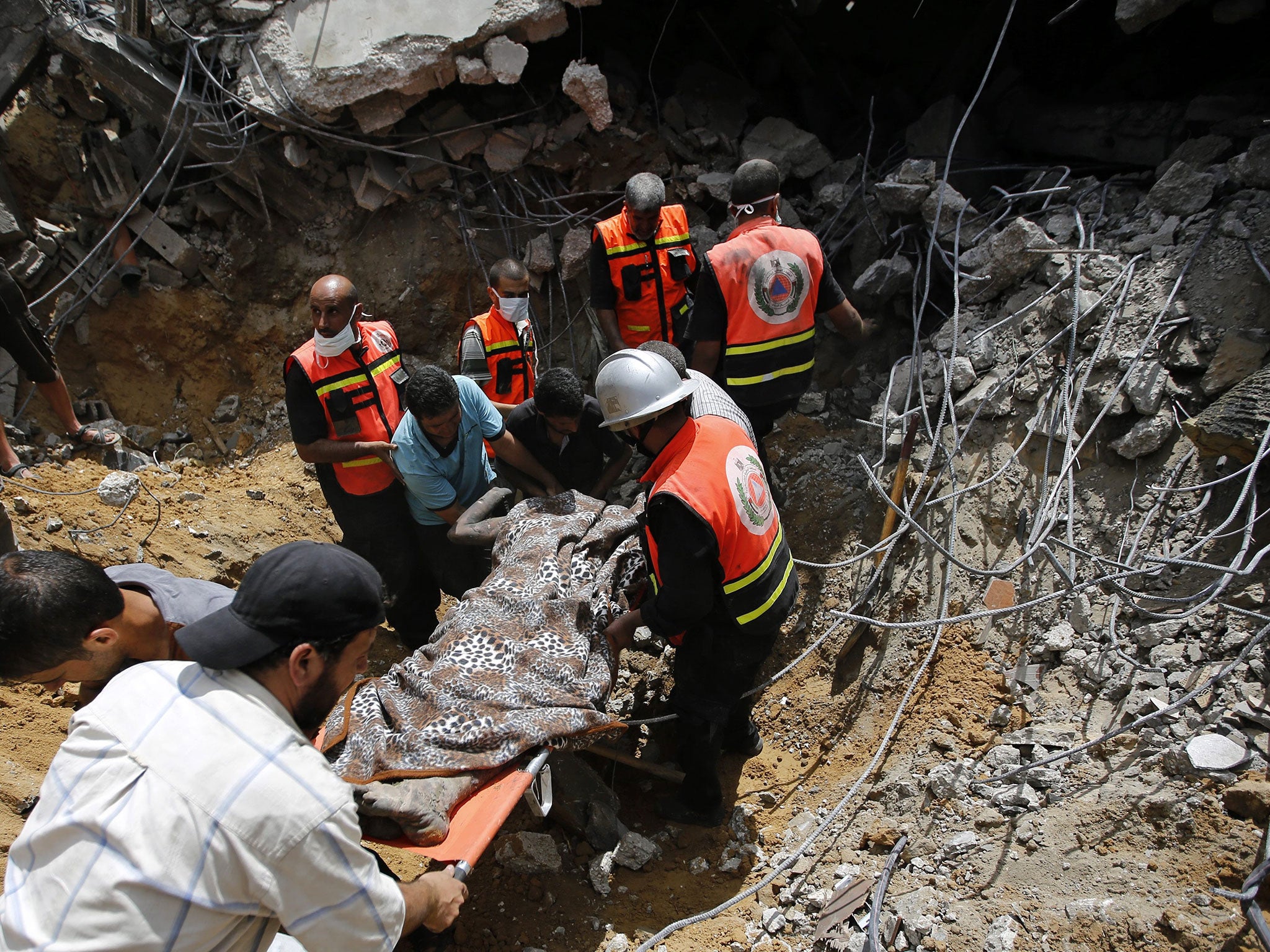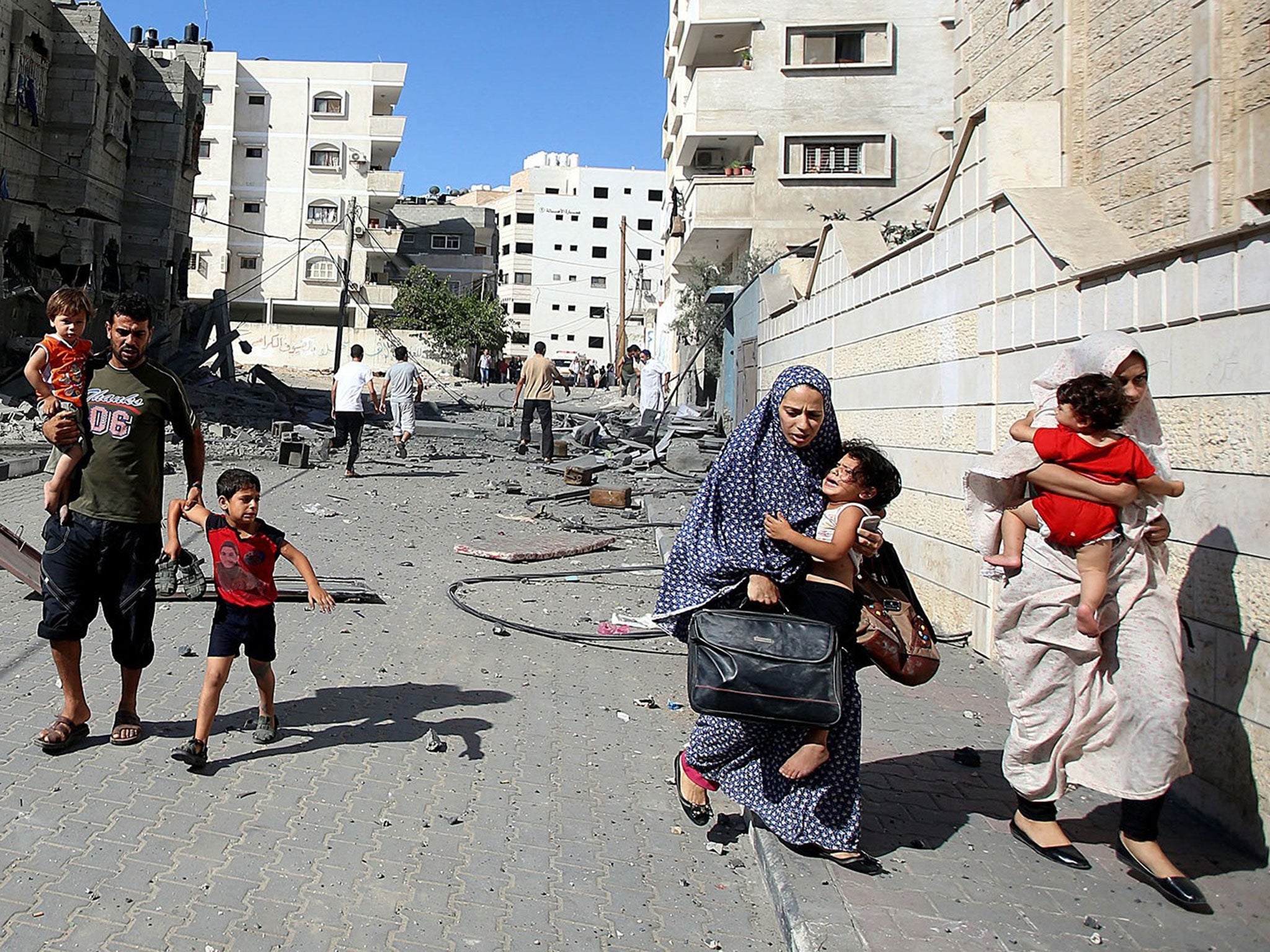Israel-Gaza conflict: 'We told you to evacuate the school,' says Israel. 'No you didn’t,' says UN
16 died and 200 were wounded in the attack on Thursday at the shelter in Beit Hanoun

Your support helps us to tell the story
From reproductive rights to climate change to Big Tech, The Independent is on the ground when the story is developing. Whether it's investigating the financials of Elon Musk's pro-Trump PAC or producing our latest documentary, 'The A Word', which shines a light on the American women fighting for reproductive rights, we know how important it is to parse out the facts from the messaging.
At such a critical moment in US history, we need reporters on the ground. Your donation allows us to keep sending journalists to speak to both sides of the story.
The Independent is trusted by Americans across the entire political spectrum. And unlike many other quality news outlets, we choose not to lock Americans out of our reporting and analysis with paywalls. We believe quality journalism should be available to everyone, paid for by those who can afford it.
Your support makes all the difference.Yusuf al-Shinwari had become increasingly anxious about the military strikes near the UN school where he and his family had taken refuge. He was hugely relieved when the call came to evacuate. But, before that could happen, the building was hit by shellfire, leaving five members of his family dead.
The 13 year old boy is in hospital with serious leg injuries. He has lost his mother Felastin, 36, brothers Ali and Abid, aged 10 and 17, sister Mariam, 14, and aunt Fatima, 48. His 15 year old sister, Manor, had to have both her legs amputated and a cousin, Ikran, 23, has suffered severe head injuries.
The Shinwaris were among the 16 who died and 200 who were wounded in the attack on Thursday at the shelter in Beit Hanoun. The lethal toll for Palestinians now stands at 832 dead, according to health officials in Gaza, and 5,400 wounded, with a high number of children in both categories. The UN has stated that the vast majority of the victims had been civilians. However, among those killed in overnight air strikes was Salah Hassanein, a leader of the military council of Islamic Jihad, and two of his sons.
Yusuf’s father, Shaiba, died two years ago. The boy and his siblings have no home to go back to near the Israeli border – it was destroyed after they left. They have no money to rent; an acquaintance had agreed to let them share an apartment, “But I don’t know how long we will be able to stay there, my older brothers will decide,” he said. “I think about my mother, the others. I keep on thinking we would all have been all right if we had gone somewhere else to stay.
“We were all sitting together around a table in the playground outside, we wanted to leave as soon as possible; we were waiting for the buses. There were three, four explosions, I was thrown and fell. I heard about my brothers, sisters later,” he said.
The killings at the school in Beit Hanoun, where hundreds had taken refuge from the fierce violence in the area, have led to deep international concern with the UN Secretary General, Ban Ki-moon and Valerie Amos, the organisation’s humanitarian chief, among those who strongly condemned the attack.
Accusations and recriminations between the UN and the Israeli military have continued on the ground. Today a team from the UN’s Relief and Works Agency (UNRWA), including an international weapons expert, which went to the school had to cut short the visit after shooting in the area.
“The Israeli army had been notified in advance about the composition of the team, the time and purpose of the visit. The mission had to be cut short and the team was forced to leave the area after gunfire around the school,” said Chris Gunness, of UNRWA. “We again underline our call for an immediate and comprehensive investigation.”
On Thursday, Mr Gunness had insisted that “precise co-ordinates of the shelter had been formally given to the Israeli army. Over the course of the day, UNRWA tried to coordinate with the Israeli army a window for civilians to leave. We spent much of the day trying to negotiate a window so that civilians, including our staff, could leave; that was never granted.”

The Israeli military initially suggested that Hamas rockets may have been responsible for the carnage. Later a spokesman said: “We cannot confirm if this tragedy took place because of our answer to the terrorists who targeted us in this area, or from Hamas fire.” After that it stated in a tweet: “Today Hamas continued firing from Beit Hanoun. The IDF [Israeli Defence Forces] responded by targeting the source of the fire.”
The Israelis also said that the UN had been provided with a window to carry out an evacuation. It said, in another tweet: “Last night, we told Red Cross to evacuate civilians from UNRWA’s shelter in Beit Hanoun btw 10am & 2pm. UNRWA & Red Cross got the message.” The reason this was not used, according to the military, was that “Hamas prevented civilians from evacuating the area during the window that we gave them.” This has been denied by the UN, the Red Cross and Hamas.
The rising tempo of air strikes, and tank and artillery rounds had, in fact, led to some of those in the shelter leaving the previous day. Safia Hamed, 55, was among them. “There were shots hitting the upper floors and they brought some of the families down to the lower floors. That’s when I decided it was time to go. We went to another school in Jabaliya: but my son refused and look at what happened.”
Ataf Rafiq Hamad, 30, was in a ward at the Kamal Udwan Hospital in Beit Lahiya, with foot injuries. “My mother was very worried, there was damage to the upper floors and she felt this would happen on the ground floor as well. Quite a few people left and, or course, I agreed with her that she should leave. I did not go because Jabaliya could also become dangerous and also because I was one of those who cleaned the school, I didn’t want to let them down.”

There are signs of shrapnel damage in houses around the UNRWA school. Ashraf al-Batus showed how one round had smashed through the second floor of his house. “This was the room my two daughters shared; luckily I had sent them away with my wife to Gaza City,” he said.
“With all the bombing it was obvious there would be lot of people dead if the place was hit. But the Israelis don’t care how many people they kill, they don’t have any humanity, they are not normal people.”
Hussein, 21, one of the surviving Shinwari brothers, recalled that the family had gone to the school in Beit Hanoun after being told that it was the only safe one in the area. “We lived near the border and the Israelis told us to go. UNRWA came and said they had talked with the Israelis and then we were told to go to the school. There were other ones, but we were told they would be too dangerous. But the Israelis were firing all around the school, so it became a really dangerous place.”
Dr Bassam al-Masri, the head of the orthopaedic department in Kamal Udwan, was among the team treating the injured from the UNRWA school. “My house is right next to the school. I don’t know what has happened to it since I left with my family,” he said. “Nothing should surprise me after what’s been happening, but still I was shocked that they fired on a shelter.
“I have been a doctor for 12 years, and this war is a lot worse than the one two years ago, and even the one in 2008. This time you can’t avoid getting attacked even if you leave your home: there is no escape, no escape at all.”
Join our commenting forum
Join thought-provoking conversations, follow other Independent readers and see their replies
Comments